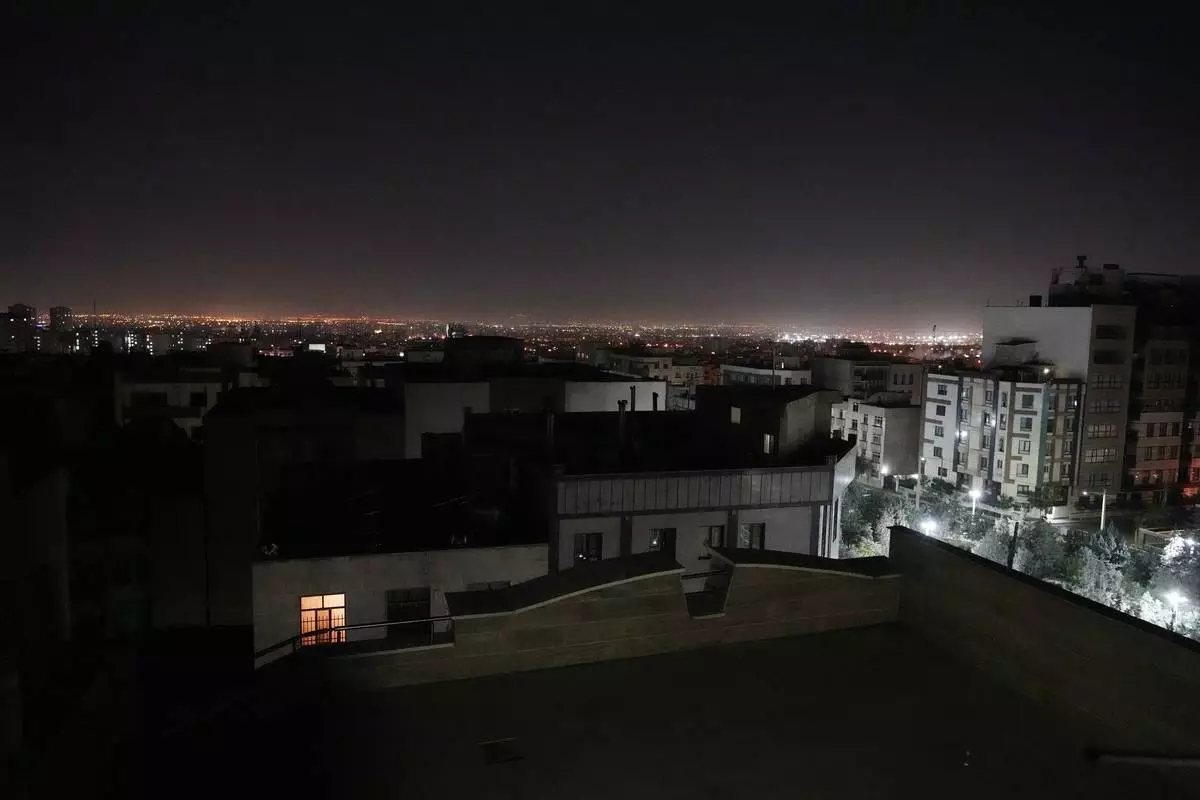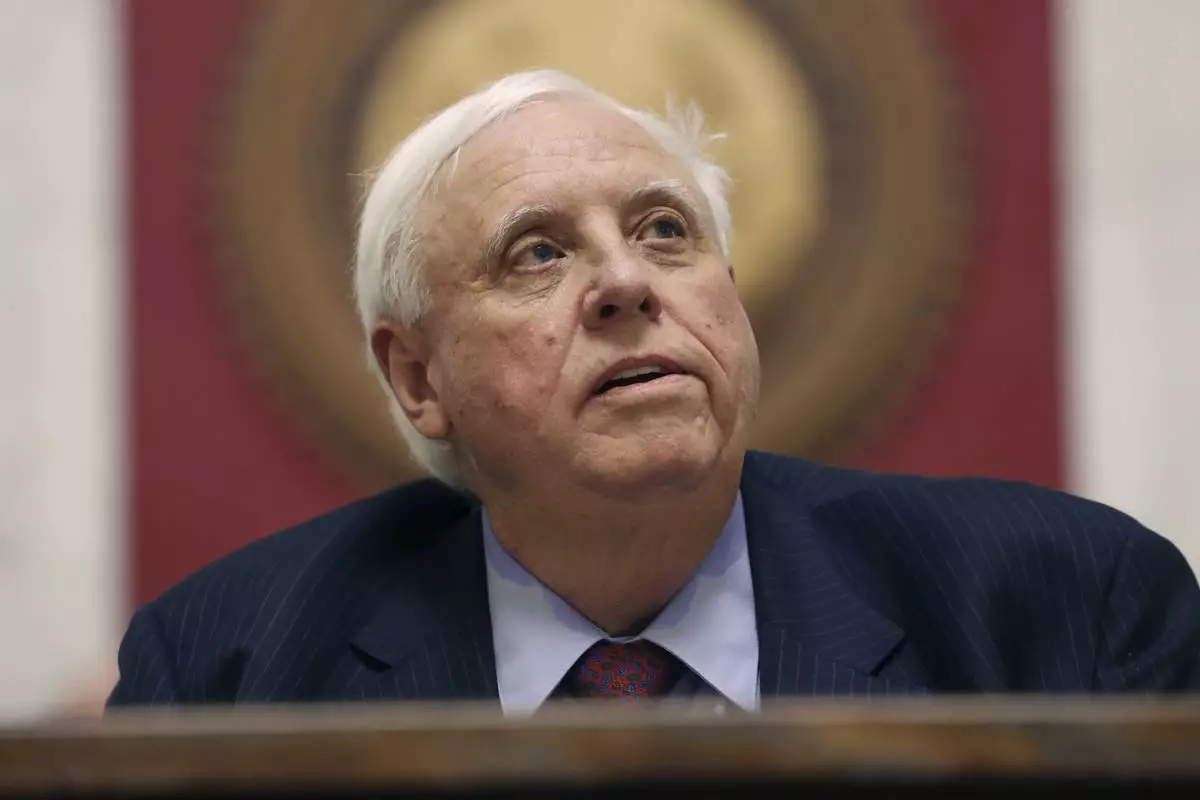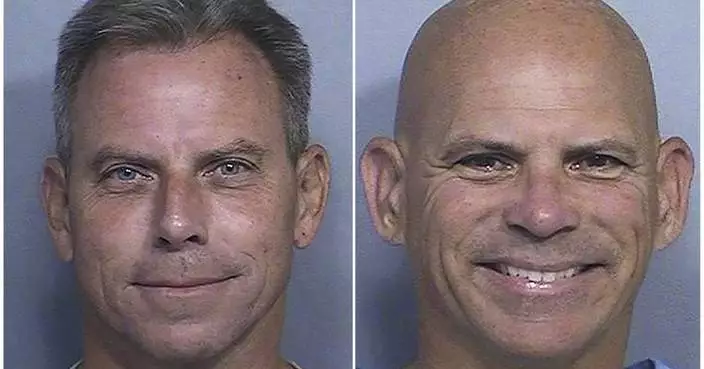JERUSALEM (AP) — Israel delivered its long-expected response to Iranian missile attacks early Saturday by carrying out a series of airstrikes against the Islamic Republic.
Here's what to know:
Under the cover of darkness early Saturday, Israel struck multiple sites in different parts of Iran. Explosions were heard in the capital, Tehran, which sits deep inside the country.
The Israeli military said its “precise and targeted strikes” hit missile air defense systems and “aerial capabilities” as well as missile manufacturing facilities used to produce weapons that have been used against Israel. Iran insisted the strikes caused only “limited damage.”
It was not immediately clear how hard of a blow Israel dealt, with neither country providing detailed assessments of the destruction. Iran said the strikes targeted military bases in the provinces of Ilam, Khuzestan and Tehran.
Israel appeared confident in its battering of Iran's air defenses, with military spokesman Rear Adm. Daniel Hagari saying that “Israel now has broader aerial freedom of operation in Iran."
The strikes did not appear to target facilities that would all but ensure a harsh Iranian response. Those most notably include Iran's oil infrastructure, the backbone of the OPEC member's economy, and its nuclear facilities.
President Biden earlier this month said he would not support an Israeli strike on Iranian nuclear sites.
U.S. officials felt they had secured agreement from Israel not to hit nuclear or oil sites after dispatching another air-defense missile battery and associated troops, though those assurances were not set in stone.
Israel signaled that the pre-dawn bombardment was the end of this attack.
"The retaliatory strike has been completed, and its objectives have been achieved,” Hagari said early Saturday, still the Sabbath in Israel.
Not long after, Iran’s Civil Aviation Organization said commercial flights would resume after being halted because of the airstrikes.
The Israeli attacks aimed to deter future aggression and “show we won’t be silent,” but to do so in a way that would minimize the embarrassment for Iran, said Yoel Guzansky, a researcher at the Tel Aviv-based Institute for National Security Studies.
The White House indicated that it wants the strikes to end the direct exchanges of fire between Israel and Iran, and warned Iran against responding.
British Prime Minister Keir Starmer said there was a “need to avoid further regional escalation” and called on all sides to show restraint.
Reactions in the region were harsher. Saudi Arabia, Iran's main Arab rival, condemned the strike, calling it a threat to regional security and “a violation of international laws and norms.”
Turkey accused Israel of having “brought our region to the brink of a greater war" and said, “putting an end to the terror created by Israel in the region has become a historic duty.”
Syria and Iraq were among other countries in the region condemning the strikes. So did Hamas, which along with other militants attacked Israel on Oct. 7, 2023, killing 1,200 people, mostly civilians, and taking some 250 hostages into Gaza.
Israel's retaliatory offensive in the Gaza Strip has so far killed more than 42,000 Palestinians, according to local health officials, who don’t differentiate between civilians and combatants but say women and children make up for more than half the deaths.
The Iranian Foreign Ministry said Iran would respond to the airstrikes, calling them a clear violation of international law as it asserted Tehran's right to self-defense.
Israel characterized Saturday's attack as a response to previous aerial assaults by Iran using missiles and exploding drones in April and another missile attack this month. Many of those projectiles were shot down before reaching their targets.
Iran could attempt another direct bombardment, though doing so risks provoking yet another direct Israeli attack on its territory at a moment when its defenses are weakened.
It could also encourage allied militant groups such as Hamas in Gaza and Hezbollah in Lebanon to intensify their attacks, though both have suffered serious blows in their ongoing wars with Israel.
“Iran will play down the impact of the strikes, which are in fact quite serious,” predicted Sanam Vakil, the director of the Middle East and North Africa program at the London-based think tank Chatham House.
She said Iran is “boxed in by their own military limitations, economic constraints from sanctions and by the U.S. election outcome,” which could affect the course of further escalation or diplomatic outreach.

A view of Tehran capital of Iran is seen, early Saturday, Oct. 26, 2024. (AP Photo/Vahid Salemi)

In this image taken from video released by the Israel Defense Forces early Saturday, Oct. 26, 2024, Israeli military spokesperson Rear Adm. Daniel Hagari announces that the IDF is conducting strikes on military targets in Iran. (Israel Defense Forces via AP)
CHARLESTON, W.Va. (AP) — More than a month before the Nov. 5 election, Jim Justice declared victory in his Senate race in deeply Republican West Virginia, a chest thump at the same time the two-term governor was in a behind-the-scenes fight to keep some of his family businesses in good standing.
In a state where Donald Trump won every county in the past two presidential elections, Justice crowned himself as the runaway successor to retiring Sen. Joe Manchin, whose seat had been one of the last lines of defense for Democrats trying to preserve their slim majority.
“I say over and over, judge me by my deeds,” Justice told reporters on Sept. 19.
That challenge could have had another meaning, serving as a reminder about the banks, creditors, federal agencies and others who have hounded Justice for years to pay his debts, including loan defaults, late payments, court fines. He's faced threats of foreclosure. Early in his administration, the governor was sued for not living in the governor's mansion in Charleston as required by law, and when he was there, his list of accomplishments wasn't particularly long or noteworthy.
Most recently, Justice's family paid a debt obligation to ward off a collection company's threat to auction off his Greenbrier resort’s historic hotel.
And yet Justice's boasting probably was justified. The politician with the folksy manner and a pet bulldog named Babydog by his side is in line for a seat that national Democrats pretty much conceded as soon as Manchin decided not to run again. Republicans had made it a top target, and leaders of both parties had come to believe that even Manchin couldn't win a third full term as a Democrat in a state that had become among the most Republican in the nation.
According to AdImpact, which tracks campaign spending data, Democrats have been outspent on the race by Republicans by more than a 5-to-1 margin, with Democrat Glenn Elliott receiving less than $3 million in help from outside groups.
Whether voters ignore Justice's baggage remains to be seen. Elliott was surprised by Justice's public declaration of victory and his refusal to hold a debate. Elliott, a former Wheeling mayor who was endorsed by Manchin before Manchin switched from the Democrat Party to an independent, said voters deserve to know more about Justice, including his finances.
“One of the frustrating parts of the campaign is all the problems the governor has, for whatever reason, does not seem to be sinking in with your average voter,” Elliott said.
In refusing to debate, Justice simply said he was too busy.
“I want to run through the finish line as the governor," he said. “That’s all there is to it."
As governor, Justice pushed through income tax cuts and billions for road repairs and construction. He played up high state revenue surpluses, job creation and tourism.
But he has been criticized for underfunding public schools and the state’s foster care system, and advocates for low-income residents say he has failed to meet the challenges facing the neediest citizens. During the pandemic, some lawmakers attacked Justice’s prize giveaways for people who got vaccinated against the coronavirus as “wasteful spending.”
West Virginia has one of the highest poverty rates in the United States. It also lost the highest percentage of residents among any state over the past decade, an exodus that cost it a seat in Congress, and continued through Justice's second term, according to U.S. Census Bureau population estimates for 2023.
While it's not certain how far back Justice's family debts go, they predate his time as governor and deprive him the right to call himself a billionaire.
“I’m surprised that the liabilities in his business and other things have really not undermined his popularity,” said Robert Rupp, a retired West Virginia Wesleyan College political history professor.
Lawsuits filed more than a decade ago sought unpaid contracting bills or debts owed from Justice family mining operations in Kentucky, Tennessee and Virginia. Just before he was elected in 2016, Justice’s coal companies owed millions in back taxes to some of Appalachia’s most impoverished counties. His companies also had millions in West Virginia state tax liens.
The challenges kept piling up, hitting a peak this year. Earlier this month Justice's family said it resolved debts to avoid the foreclosure on the Greenbrier hotel, which has hosted presidents and royalty at the resort he bought out of bankruptcy in 2009. A union official at the Greenbrier said in August that Justice's family was at least $2.4 million behind in payments to an employees' health insurance fund, putting workers' coverage at risk.
Justice, who switched parties seven months after taking office, has repeatedly said efforts to seize the hotel were political revenge. The state Democratic Party said it was "a direct consequence of his own financial incompetence.”
Elliott, looking to spread the word, embarked on a summer tour of all 55 counties. Justice conducted few fall campaign stops, instead making economic development announcements and school visits, bringing along Babydog.
Elliott said residents should pay attention to who Justice is, “not the one they see on TV with the dog and the checks to hand out at different ribbon cuttings. But the one who doesn’t pay his bills and doesn’t pay his taxes. Doesn’t respect the process. Doesn’t show up to work. Doesn’t think the voters deserve a chance to see him debate and basically takes their votes for granted.”
Justice's campaign has raised $4.3 million, compared with about $800,000 for Elliott. Justice has stuck to the path he took during an easy GOP primary win over U.S. Rep Alex Mooney.
Even Justice marvels at how smoothly his ride has been.
“I don’t want to say this in an egotistical way," Justice told reporters last month. "In the primary, I didn’t put a sign out. Think about this for a second. I didn’t put one single sign up, and I won by 35-plus points. The people of this state know me. They know me, and they know me really well. I have done almost zero campaigning.
“From the Senate race standpoint and everything, the Senate race is over. We’re going to win the race, and we’re going to win the race going away.”

FILE - The Greenbrier resort, established in 1778, is seen here in White Sulphur Springs, W.Va., Sept. 15, 2019. (AP Photo/Steve Helber, File)

FILE - West Virginia Democratic Senate candidate Glenn Elliott gives a victory speech during the primary election results, May 14, 2024, in Wheeling, W.Va. (AP Photo/Kathleen Batten, File)

FILE - West Virginia Gov. Jim Justice, the Republican senatorial candidate, delivers his State of the State address, Jan. 10, 2024, in Charleston, W.Va. (AP Photo/Chris Jackson, File)














